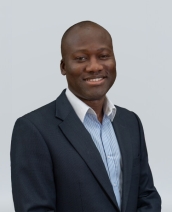Emmanuel Aisabokhae
Principal
Emmanuel has 15+ years experience in clinical practice, biopharma operations and healthcare consulting, across Europe, Middle East & N. America

Education
Past Experience

Emmanuel is a Principal based in our New York office. He is a core member of the Healthcare & Lifesciences practice and advises clients on a range of topics including clinical trial acceleration, drug launch preparation and post patent expiry value maximization.
Emmanuel is also a topic expert in pharmacy operations both in the public and private sectors.
Prior to working at Arthur D. Little, Emmanuel worked as a Pharmacist in the UK National Health Service where he gained experience in both public and private sector pharmacy operations, as well as clinical experience across several therapy areas including general medicine, psychiatry, pediatrics, oncology and ophthalmology.
Emmanuel also has multi-function and multi-therapy area experience from Johnson & Johnson Pharmaceuticals and Allagium Therapeutics.
Emmanuel holds a MBA from Manchester Business School and Master of Pharmacy degree from Manchester University

Why patient centricity is key to long-term pharma company success


Pursuing excellence: What’s next for finance in healthcare?

CAR-T on site: Forgoing the extra mile



Emmanuel is a Principal based in our New York office. He is a core member of the Healthcare & Lifesciences practice and advises clients on a range of topics including clinical trial acceleration, drug launch preparation and post patent expiry value maximization.
Emmanuel is also a topic expert in pharmacy operations both in the public and private sectors.
Prior to working at Arthur D. Little, Emmanuel worked as a Pharmacist in the UK National Health Service where he gained experience in both public and private sector pharmacy operations, as well as clinical experience across several therapy areas including general medicine, psychiatry, pediatrics, oncology and ophthalmology.
Emmanuel also has multi-function and multi-therapy area experience from Johnson & Johnson Pharmaceuticals and Allagium Therapeutics.
Emmanuel holds a MBA from Manchester Business School and Master of Pharmacy degree from Manchester University

Why patient centricity is key to long-term pharma company success


Pursuing excellence: What’s next for finance in healthcare?

CAR-T on site: Forgoing the extra mile


More About Emmanuel
- Manchester Business SchoolMBA
- Manchester UniversityMaster of Pharmacy
- Arthur D. LittleHealthcare & Life Sciences / Manager
- Allagium TherapeuticsDrug development
- Johnson & JohnsonR&D/Sales/Marketing/Business Dev
- National Health Service, UKPharmacist